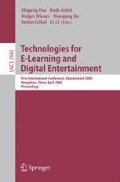Abstract
Due to the advance of e-community, collaborative learning becomes popular on the Web. Among the learning models for collaborative learning on the Web, there are seminar-based model and project-based model. The objective of this paper is to compare the two learning models by analyzing learners’ activities. Among learners’ activities, we focus on learners’ interaction level, their collaborability, and their accountability. Also, we propose new assessment items for evaluating learners fairly. In this paper, the existing evaluation items in traditional classroom-based collaborative learning are firstly analyzed in order to develop new evaluation criteria for the Web. Based on these analyzed items, we propose new items for assessing learners’ activities in Web-based collaborative learning. After two Web-based classes, each of which has a different learning model, are performed, the proposed items are applied to compare the two learning models in terms of learners’ interaction level, collaborability, and accountability. By performing this research, we can understand learners’ activities clearer and can develop a better instructional technique to make improved academic achievement, improved attendance, and increased self-confidence in collaborative e-learning.
This work was supported by Korea Research Foundation (KRF-2003-003-B00290).
Access this chapter
Tax calculation will be finalised at checkout
Purchases are for personal use only
Preview
Unable to display preview. Download preview PDF.
References
Baek, Y.K.: Design of Web-based Learning. Yangseowon Publishing Co. (1999)
Bonk, C.J.: Collaborative Tool for e-Learning (2002), http://www.clomagazine.com
Boo, S.M., Park, C.J.: Development of Self/Peer Assessment Items for Cooperative Learning. Korean Domestic Journal of Computer Education 6(1) (2003)
Chi, E., Park, C., Rim, H.: Evaluating the Web-based Instruction by Item Analysis. In: Kumar, V., Gavrilova, M.L., Tan, C.J.K., L’Ecuyer, P. (eds.) ICCSA 2003. LNCS, vol. 2668. Springer, Heidelberg (2003)
Cohen, E.G.: Restructuring the Classroom: Conditions for Productive Small Groups. Review of Educational Research 64(1) (1994)
Cornell University, Likert Scaling (2002), http://trochim.human.cornel.edu/kb/scallik.htm
Johnson, D., Johnson, R.: Cooperative Learning (2001), http://www.clcrc.com/pages/cl.html
Disney Learning Partnership. Cooperative and Collaborative Learning: Explanation, http://www.thirteen.org/edonline/concept2class/month4/index.html
Harasim, L., Calivert, T., Groeneboer, C.: Virtual-U: A Web-based System to Support Collaborative Learning (1995), http://kmh.ync.ac.kr/html/whtml/wbi/ch18.html
Kang, M.O.: Collaborative Learning Strategy for Web-based Linguistics Lectures. In: Proceedings of the 23rd Korean Domestic Conference on Korean Linguistics (2002)
Kang, I.A., Lee, M.S., Kim, J.H., Lee, I.S.: Case Study on Web-based Problem-solving Learning Model. Korean Domestic Journal of Education Engineering 15(1) (1999)
Kaufman, D.B., Felder, R.M.: Accounting for Individual Effort in Cooperative Learning Teams. Journal of Engineering Education 89(2) (2000)
Lamb, A.: Project, Problem, and Inquiry-Based Learning (2004), http://eduscapes.com/tap/topic43.htm
Park, D.S.: Methodology for Constructing Items. Education & Science Publishing Co. (1999)
Roh, H.J.: Investigation Method and Statistical Analysis using Korean SPSS 10.0. Hyungseol Publishing Co. (2002)
Slavin, R.E.: Cooperative Learning: where behavioral and humanistic approaches to classroom motivation meet. Elementary School Journal 88 (1987)
Valiathan, P.: Blended Learning Models (2002), http://www.learningcircuits.org/2002/aug2002/valiathan.html
Willkins, D.E., Lawhead, P.B.: Evaluating Individuals in Team Projects. In: Proceedings of SIGCSE (2000)
Author information
Authors and Affiliations
Editor information
Editors and Affiliations
Rights and permissions
Copyright information
© 2006 Springer-Verlag Berlin Heidelberg
About this paper
Cite this paper
Park, C.J., Hyun, J.S. (2006). Comparison of Two Learning Models for Collaborative e-Learning. In: Pan, Z., Aylett, R., Diener, H., Jin, X., Göbel, S., Li, L. (eds) Technologies for E-Learning and Digital Entertainment. Edutainment 2006. Lecture Notes in Computer Science, vol 3942. Springer, Berlin, Heidelberg. https://doi.org/10.1007/11736639_9
Download citation
DOI: https://doi.org/10.1007/11736639_9
Publisher Name: Springer, Berlin, Heidelberg
Print ISBN: 978-3-540-33423-1
Online ISBN: 978-3-540-33424-8
eBook Packages: Computer ScienceComputer Science (R0)

